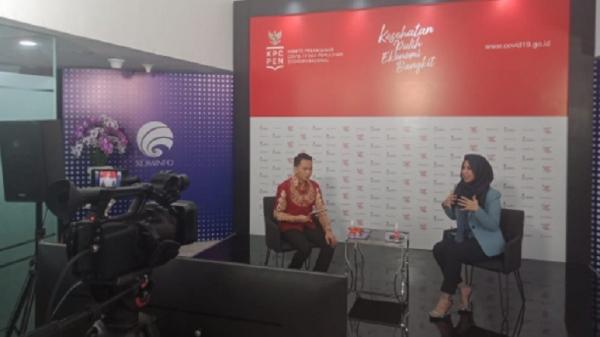JAKARTA, iNews.id – The public is considered not to be afraid of vaccination. Since the 18th century vaccination or immunization has been shown to have a high success rate in protecting humans.
Director of Health Surveillance and Quarantine of the Directorate General of P2P Ministry of Health (Kemenkes) R Vensya Sitohang said vaccination provides immunity from various diseases. Examples of success vaccine, namely the prevention of smallpox transmission in the 1980s.
“Don’t be afraid of immunization because the quality is maintained and of course, from registration to manufacturing is maintained. It is also guarded by WHO and of course the implementation in Indonesia is also guarded by BPOM, “said Vensya when speaking at the dialogue entitled Vaccines: Protecting Yourself, Protecting the Country at the Media Center, Committee for Handling Covid-19 and National Economic Recovery (KPCPEN), and broadcast online. , Thursday (1/10/2020).
He said, vaccines were available for various diseases, from smallpox, polio, tuberculosis, pneumonia, tetanus, measles, rubella, hepatitis B, diphtheria, japanese enchephalitis, pertussis, and the latest cervical cancer. Including maternal tetanus and for newborns that were successfully eliminated in 2016. There are also maternal and neonatal diseases.
“The development of vaccination never stops. Therefore, support from all parties is needed so that all those who are targeted for immunization can get their rights and receive immunizations in order to avoid diseases that can be prevented through immunization,” he said.
According to him, to regulate the provision of vaccines the government has prepared Law no. 36 of 2009 concerning Health. Every child, he said, has the right to get basic immunization according to the provisions to prevent diseases that are avoided through immunization.
In addition, through Permenkes No. 12 of 2017 the government will provide and distribute all logistics related to immunization starting from the vaccine, syringes, safety boxes and so on.
Meanwhile, specifically for the Covid-19 vaccine, so far the government has prepared a roadmap so that the vaccine is available on time. “For the short term, the Government has conducted diplomacy with various parties in the provision of vaccines. In the long term, the development of the Red and White vaccine will be carried out for domestic production, “he said.
On the same occasion, the Head of Public Relations and Welfare of the Members of the Indonesian Pediatrician Association (IDAI) Hartono Gunadi conveyed the wrong understanding that a healthy child will have a fever after being vaccinated so that there is a growing perception that immunization is dangerous. In fact, only 1 percent of 100 percent of the immunized children may suffer from fever.
“The side effects are very mild and temporary and can be relieved by simple treatment compared to the complications that can be caused if the child does not have immunity,” he said.
He gave an example, the pentavalent immunization that is not given, a child can get diphtheria, tetanus, cough for 100 days including pneumonia which is the number one cause of death in children under 5 years.
According to him, the side effects of vaccines or what are known as post-immunization follow-up events (AEFI) are divided into 2. There are general or systemic AEFIs such as fever, decreased appetite, weakness or fussiness which is the most frequent.
The side effects were considered only temporary and disappeared in 1 or 2 days. Then, he said, there was a local AEFI like injection marks that would cause soreness, swelling or redness that would disappear in a few days. Parents were asked not to panic and fear immunization.
Meanwhile, Unicef Indonesia’s Communication for Development Specialist Rizky Ika Syafitri said that Indonesia has been implementing the immunization program for more than 30 years. In fact, in the world it has been longer and has been proven that vaccines save millions of children from death, illness and disability.
In providing immunization to the community there are many challenges faced, such as people who do not know immunization is important. In addition, there are also fake news related to immunization.
“The government together with Unicef and other institutions are trying to answer various misinformation and fake news related to immunization,” he said.
Editor: Divine Grace


